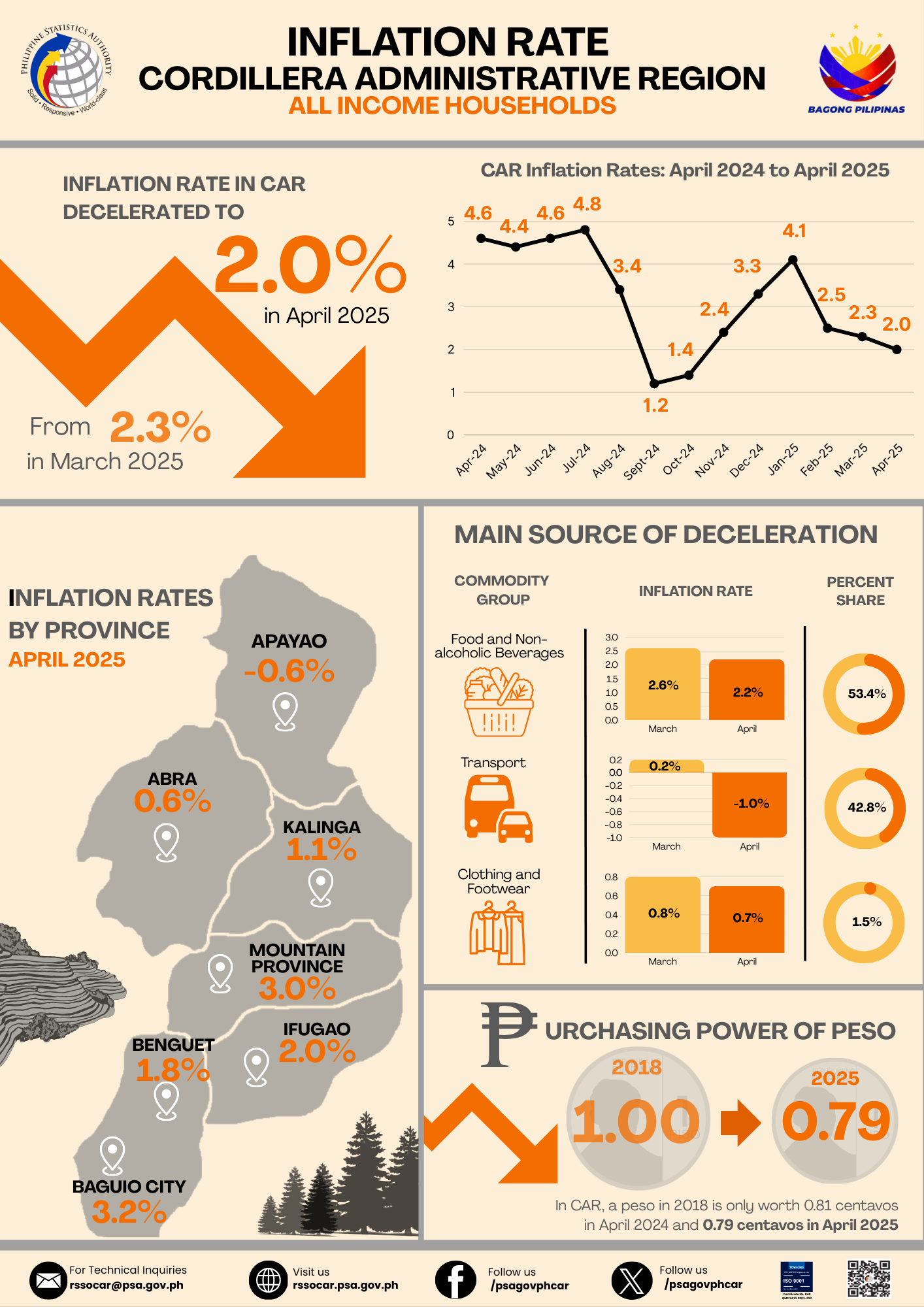Summary Inflation Report
Consumer Price Index
(2018=100)
|
Area |
July 2022 |
June 2023 |
July 2023 |
|
CAR |
7.3 |
3.2 |
2.9 |
|
IFUGAO |
5.5 |
3.2 |
3.9 |
Inflation in Ifugao increased to 3.9 percent in July 2023 from 3.2 percent in June 2023. In addition, July 2023 inflation was lower by 1.6 percentage points from 5.5 percent in July 2022 and 0.7 percentage points higher from 3.2 percent in July 2023. (Table 1)
Figure 1. Inflation Rates, Ifugao, All Items (2018=100)
Figure 2. Year-on-Year Inflation Rates by Commodity Group: Ifugao (2018 = 100) (In Percent)
- Recreation, Sport and Culture, 9.3;
- Personal Care, and Miscellaneous Goods and Services, 7.7;
- Food and Non-Alcoholic Beverages, 7.2;
- Health, 5.8;
- Alcoholic Beverages and Tobacco, 5.2;
- Education Services, 3.7;
Table 2. Consumer Price Index for All ltems,
Ifugao (2018=100)
|
Area |
July 2022 |
June 2023 |
July 2023 |
|
CAR |
115.6 |
118.6 |
119.0 |
|
Ifugao |
116.8 |
120.0 |
121.4 |
Survey of Retail Prices of Commodities conducted by Philippine Statistics Authority (PSA) has generated a Consumer Price Index (CPI) of 121.4 in Ifugao as of July 2023, using 2018 as the base year. This indicates that the average cost of a basket of goods and services commonly purchased by a typical Filipino household in the different municipalities of Ifugao increased during the reference month.
Figure 3. Consumer Price Index for All Income Households by Commodity Group, Ifugao (2018=100)
TECHNICAL NOTES
Consumer Price Index (CPI)
The CPI is an indicator of the changes in the average retail prices of a fixed basket of goods and services that most people buy for their day-to-day consumption relative to a base year.
Uses of CPI
The CPI is most widely used to calculate inflation rate and the purchasing power of peso. It is a major statistical series used for economic analysis and as monitoring indicator of government economic policy. It is also used to adjust other economic series for price changes. For example, CPI components are used as deflators for most personal consumption expenditures (PCE) in the calculation in the Gross National Product (GNP). Another major importance of the CPI is its use as basis to adjust wages in labor management contracts as well as pensions and retirement benefits. Increases in wages through collective bargaining agreements used the CPI as one of their bases.
Computation of the CPI
The computation of the CPI involves consideration of the following important points:
- Base Period.
The reference date or period is the benchmark or reference date or period at which the index is taken as equal to 100
- Market Basket
A sample of the thousands of varieties of goods purchased for consumption and services availed by the households in the country was selected to represent the composite price behavior of all goods and services purchased by consumers.
- Weighting System
The weighting pattern uses the expenditures on various consumer item purchased by households as proportion to total expenditure.
- Formula
The formula used in computing the CPI is the weighted arithmetic mean of price relatives, the Laspeyre’s formula with a fixed base year period (2012) weights.
- Geographic Coverage
CPI values are computed at the national, regional, and provincial levels, and for selected cities.
Inflation Rate (IR)
The Inflation Rate is the rate of change or the year-on-year change of the CPI. Inflation is interpreted in terms of declining purchasing power of peso.
- Headline Inflation
Headline inflation refers to the rate of change in CPI. It captures the changes in the cost of living based on the movements of prices of items in the basket of commodities and services consumed by the typical Filipino households.
- Core Inflation
Core inflation measures the change in average consumer prices after excluding from the CPI certain items with volatile price movements. By stripping out the volatile components of the CPI, core inflation allows us to see the broad underlying trend in consumer prices. Core inflation is often used as an indicator of the long-term inflation trend and as indicator of future inflation. It is usually affected by the amount of money in the economy relative to production, or by monetary policy.
Purchasing Power of the Peso (PPP)
The purchasing power of the peso (PPP) shows how much peso in the base period is worth in the current period. It is computed as the reciprocal of the CPI for the period under review multiplied by 100.
DELANO C. BOLISLIS, JR.
Chief Statistical Specialist



